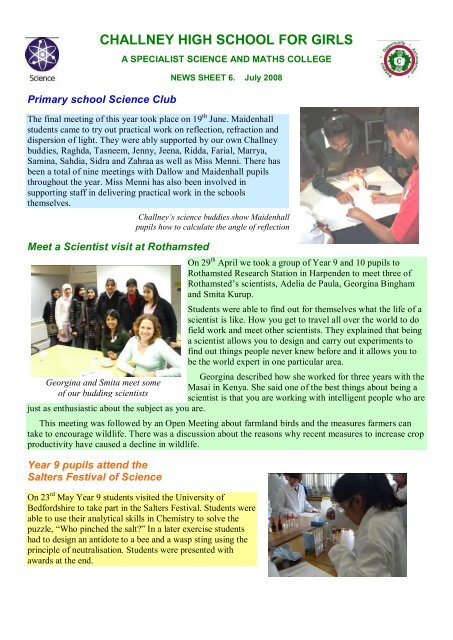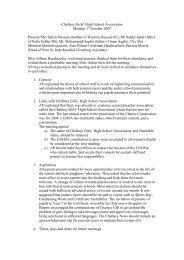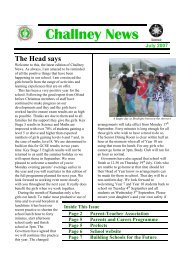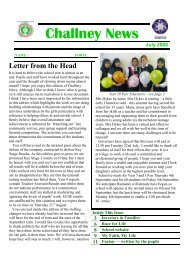CHALLNEY HIGH SCHOOL FOR GIRLS
CHALLNEY HIGH SCHOOL FOR GIRLS
CHALLNEY HIGH SCHOOL FOR GIRLS
You also want an ePaper? Increase the reach of your titles
YUMPU automatically turns print PDFs into web optimized ePapers that Google loves.
<strong>CHALLNEY</strong> <strong>HIGH</strong> <strong>SCHOOL</strong> <strong>FOR</strong> <strong>GIRLS</strong><br />
Primary school Science Club<br />
A SPECIALIST SCIENCE AND MATHS COLLEGE<br />
NEWS SHEET 6. July 2008<br />
The final meeting of this year took place on 19 th June. Maidenhall<br />
students came to try out practical work on reflection, refraction and<br />
dispersion of light. They were ably supported by our own Challney<br />
buddies, Raghda, Tasneem, Jenny, Jeena, Ridda, Farial, Marrya,<br />
Samina, Sahdia, Sidra and Zahraa as well as Miss Menni. There has<br />
been a total of nine meetings with Dallow and Maidenhall pupils<br />
throughout the year. Miss Menni has also been involved in<br />
supporting staff in delivering practical work in the schools<br />
themselves.<br />
Meet a Scientist visit at Rothamsted<br />
Georgina and Smita meet some<br />
of our budding scientists<br />
just as enthusiastic about the subject as you are.<br />
On 29 th April we took a group of Year 9 and 10 pupils to<br />
Rothamsted Research Station in Harpenden to meet three of<br />
Rothamsted’s scientists, Adelia de Paula, Georgina Bingham<br />
and Smita Kurup.<br />
Students were able to find out for themselves what the life of a<br />
scientist is like. How you get to travel all over the world to do<br />
field work and meet other scientists. They explained that being<br />
a scientist allows you to design and carry out experiments to<br />
find out things people never knew before and it allows you to<br />
be the world expert in one particular area.<br />
Georgina described how she worked for three years with the<br />
Masai in Kenya. She said one of the best things about being a<br />
scientist is that you are working with intelligent people who are<br />
This meeting was followed by an Open Meeting about farmland birds and the measures farmers can<br />
take to encourage wildlife. There was a discussion about the reasons why recent measures to increase crop<br />
productivity have caused a decline in wildlife.<br />
Year 9 pupils attend the<br />
Salters Festival of Science<br />
Challney’s science buddies show Maidenhall<br />
pupils how to calculate the angle of reflection<br />
On 23 rd May Year 9 students visited the University of<br />
Bedfordshire to take part in the Salters Festival. Students were<br />
able to use their analytical skills in Chemistry to solve the<br />
puzzle, “Who pinched the salt?” In a later exercise students<br />
had to design an antidote to a bee and a wasp sting using the<br />
principle of neutralisation. Students were presented with<br />
awards at the end.
Applied Scientists visit Brooms Barn Agricultural Research Station<br />
Looking at plant parasites<br />
New Intake Day<br />
The Year 6 New Intake Day on 3 rd July allowed students<br />
from the Challney Science club to demonstrate their<br />
practical expertise in Science. They showed students how<br />
to make a lava lamp and how to make their own<br />
cosmetics, demonstrating some of the practical<br />
applications of understanding the science of materials. The<br />
Challney Science club meets after school on Mondays in<br />
Lab 16 if you would like to join.<br />
Rothamsted Scientists visits Challney<br />
On 13 th May, twenty Applied Science students went to Brooms Barn<br />
in Suffolk to find out more about the type of research that is carried<br />
out there. Brooms Barn advises farmers on how to encourage<br />
wildlife while reducing the damage to their crop caused by wildlife.<br />
Scientists are also interested in breeding drough resistant varieties<br />
of sugar beet and onions, an imporant advantage in the event of<br />
global warming. They are also trying to breed potato and sugar beet<br />
plants resistant to Yellowing virus, a disease spread by aphids.<br />
Pupils were taken round the station on a hay wagon pulled by a<br />
tractor. We finished the visit in the laboratory where students were<br />
able to see the aphids that cause the disease.<br />
On the 14 th May we were pleased to welcome Dr Nera Muttucumaru to Challney to talk to Year 9 about her<br />
research work on the presence of Acrylamides in food. These chemicals have been found in fried foods that<br />
are rich in carbohydrate such as chips. Acrylamides are known to be carcinogenic (can cause cancer). The<br />
aim of Nera's research is to reduce the amount of acrylamides in food while retaining it's flavour of the food.<br />
Students were able to use the information from the presentation to produce Science in the News coursework.<br />
On the 10 th July Nicola Yates came to Challney to talk to Year 10 pupils about Climate Change. This<br />
involved a discussion about the evidence for carbon dioxide as the cause of global warming. Research at<br />
Rothamsted has focussed on the growth of biofuels, providing oils, gases and ethanol from crop plants and<br />
whether they are really carbon neutral. Nicola was also able to explain how she came to work as a scientist<br />
and the reasons why she enjoys the work.<br />
Geography Field Trip to Hitchin<br />
Students on the Geography Field Trip were able to use the science department’s decibel counters to measure<br />
the noise level in their sample area in Hitchin. The trip was supported through the STEM Access project.<br />
Science Events<br />
Science club members show their lava lamps<br />
“Tropical Encounters” will be here on 16 th July to give Year 9 a chance to meet their snakes, spiders,<br />
meercats and hedgehogs and consider the adaptations that make these animals born survivors. On 18 th July<br />
all of Year 10 will be involved in the Royal Society of Chemistry’s “Chemistry at Work Day”.<br />
We hope all the students who are going to the Science, Natural History or Space museums on Off Time table<br />
day have an enjoyable and educational time. Try to remember what you have seen and tell us when you<br />
come back to school what you most enjoyed. Next term: Luton Astronomical Society has three meetings<br />
planned for the Autumn term, Sept 25 th , Oct 30 th and Nov 27 th looking at topics such as Double stars,<br />
Aurorae and the moon Titan.<br />
The next Rothamsted meeting is on Tuesday 16 th September when there will be an open meeting to discuss<br />
“How Science can help feed the developing world”. Prior to this meeting we hope to have another careers<br />
event to allow pupils to meet Rothamsted scientists.<br />
If you would like to be involved in any of these events please see Mr Mackenzie for details.





